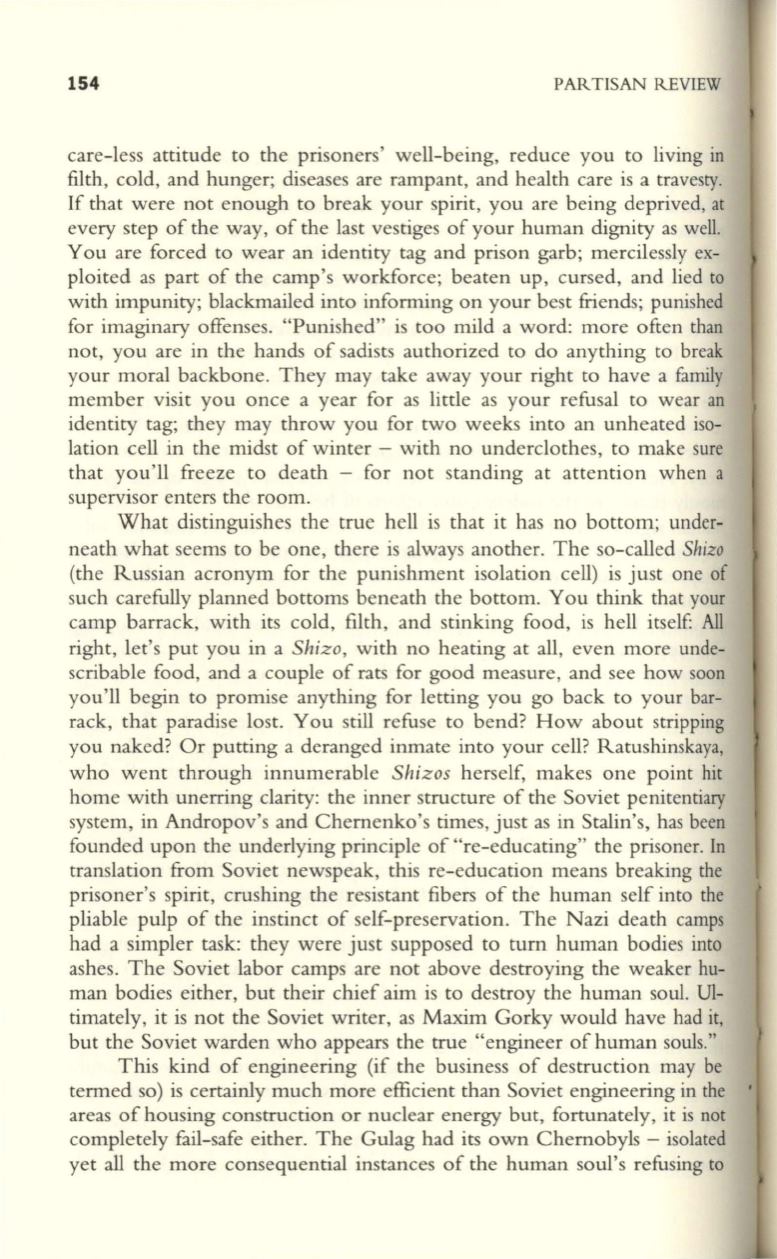
154
PARTISAN REVIEW
care-less attitude to the prisoners' well-being, reduce you to living in
filth, cold, and hunger; diseases are rampant, and health care is a travesty.
If that were not enough to break your spirit, you are being deprived, at
every step of the way, of the last vestiges of your human dignity as well.
You are forced to wear an identity tag and prison garb; mercilessly ex–
ploited as part of the camp's workforce; beaten up , cursed, and lied to
with impunity; blackmailed into informing on your best friends; punished
for imaginary offenses. "Punished" is too mild a word: more often than
not, you are in the hands of sadists authorized to do anything to break
your moral backbone . They may take away your right to have a family
member visit you once a year for as little as your refusal to wear an
identity tag; they may throw you for two weeks into an unheated iso–
lation cell in the midst of winter - with no underclothes, to make sure
that you'll freeze to death - for not standing at attention when a
supervisor enters the room.
What distinguishes the true hell is that it has no bottom; under–
neath what seems to be one, there is always another. The so-called
Shizo
(the Russian acronym for the punishment isolation cell) is just one of
such carefully planned bottoms beneath the bottom. You think that your
camp barrack, with its cold, filth, and stinking food, is hell itself: All
right, let's put you in a
Shizo,
with no heating at all, even more unde–
scribable food, and a couple of rats for good measure, and see how soon
you'll begin to promise anything for letting you go back to your bar–
rack , that paradise lost. You still refuse to bend? How about stripping
you naked? Or putting a deranged inmate into your cell? Ratushinskaya,
who went through innumerable
Shizos
herself, makes one point hit
home with unerring clarity: the inner structure of the Soviet penitentiary
system, in Andropov's and Chernenko's times, just as in Stalin's, has been
founded upon the underlying principle of "re-educating" the prisoner. In
translation from Soviet newspeak, this re-education means breaking the
prisoner's spirit, crushing the resistant fibers of the human self into the
pliable pulp of the instinct of self-preservation. The Nazi death camps
had a simpler task: they were just supposed to turn human bodies into
ashes. The Soviet labor camps are not above destroying the weaker hu–
man bodies either, but their chief aim is to destroy the human soul. Ul–
timately, it is not the Soviet writer, as Maxim Gorky would have had it,
but the Soviet warden who appears the true "engineer of human souls."
This kind of engineering (if the business of destruction may be
termed so) is certainly much more efficient than Soviet engineering in the
areas of housing construction or nuclear energy but, fortunately, it is not
completely fail-safe either. The Gulag had its own Chernobyls - isolated
yet
all
the more consequential instances of the human soul's refusing to


